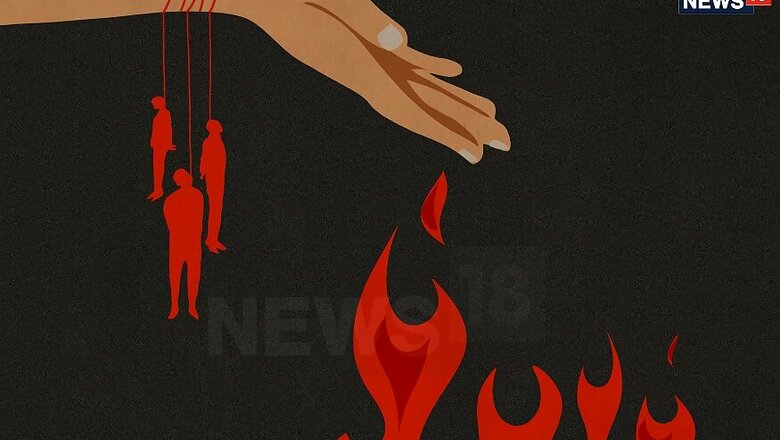
views
New Delhi: Delhi’s Burari witnessed on Sunday what the entire country has been subjected to for decades. Giving in to occult practices is normal for a country that boasts of unparalleled development. However, any attempt against criminalising black magic or superstitions gets diluted under the garb of hampering societal norms and disrupting age-old beliefs.
It took Narendra Dabholkar 18 years to get the state administration to implement the Maharashtra Prevention and Eradication of Human Sacrifice and Other Inhuman, Evil and Aghori Practices and Black Magic Act, 2013.
“In Maharashtra, the Andhashraddha Nirmoolan Samiti and my father, Narendra Dabholkar, fought for 18 years for such a law to be put in place. There were several groups which tilted the conversation by projecting it as a law against religion. He had to fight a relentless battle against them,” said Dabholkar's daughter Mukta.
Opponents to the legislation in Maharashtra had claimed that the law would affect the religious practices of Hindus; that it was anti-Hindu.
According to data sourced from National Crime Records Bureau, 2,000 women have been killed in the name of witchcraft in the country in the last 14 years.
Even after the 18-year-old struggle, Maharashtra government rejected 15 out of the 27 suggestions made in the draft bill. The state government cited reasons such as hurting religious sentiments and changing demographic beliefs. The state, though cautious, may not be entirely wrong.
“The law is complex. It not easy to implement it as it only has to be applied to those superstitious acts that are harmful. Going to a temple for example also has no scientific explanation but one cannot ban that as there is no one directly harmed in the process,” said advocate Rahul Mehra, legal counsel of the Aam Aadmi Party (AAP).
According to Maharashtra Police eight instances of human sacrifice have been reported since the passing of this law in 2013. There have also been 400 cases of harmful acts inflicted under the garb of spirituality in the state ever since the law has been rolled out.
Multiple senior police officials speaking anonymously said that while there are criminal penal codes and sections to book murderers and rapists, there is no separate law to segregate those crimes committed under the garb of occult practices.
What complicates matters further is a victim's willing submission to tantriks or faith healers which makes it difficult to pin the culprit in court. There are usually no witnesses. Most perpetrators of these crimes take refuge in the name of religion, accusing the police of victimising their community if action is initiated action against them.
The anti-superstition law also makes it possible to curtail activities of so-called godmen before they become too powerful. “Recently, the Maharashtra police arrested one who called himself Patil Baba and an avatar of god. He abused disciples by calling it his blessing; he prevented them from going to doctors. He had a huge following and if this law wasn’t in place, nothing could have been done to stop him,” added Mukta.
There is a section in the Maharashtra legislation which specifically addresses and checks claims made by ‘godmen’ who say they have supernatural powers. More recently, attempt at coming up with a legislation to ban such practices in Karnataka portrayed a similar story.
The Karnataka cabinet in September last year cleared a watered-down version of an anti-superstition bill that sought to balance then chief minister Siddaramaiah's avowed 'rationalist' stand with the necessity of keeping all sections happy in an election year.
Siddaramaiah has been trying to get this bill cleared right from the beginning of his term as chief minister in 2013, but has faced stiff opposition from all quarters including several senior ministers.
“It is the most difficult task to implement a law banning superstitions in India. No political parties are willing to burn their fingers,” said Kaboru Thimappa, responsible for drafting the anti-superstition bill in the state called Karnataka Prevention and Eradication of Human Sacrifices and other Inhuman Evil and Aghori Practices and Black Magic Bill, 2017.
The bill, however, explicitly exempts vaastu and astrology from being considered superstition, along with several other exemptions under the category of accepted religious practices. Siddaramaiah has, on several occasions, publicly mocked astrologers, particularly those on regional television and said they had caused misery and cheated many people.
Hidden skeletons
“I have seen such cult groups sedate their subjects with drugs and make them do whatever they want. We cannot just mention cult groups and rule out the possibility of drug cartels behind this,” said Nalini Deka, senior psychologist in Delhi University.
Also, several psychologists informed News18 that mental diseases like schizophrenia resulting in split personality are also found to be cause of individuals killing themselves and others.
“There is a serious concern that while we conclude spiritual and mystical reasons for deaths, we may just be passing off the possibility of mental illnesses,” added Nalini.
Popular spiritual leader Jaggi Vasudev, also known as Sadhguru, defines occultism as a form of technology. “So, when we say occult, because people have heard of some lousy occultist who tried to destroy someone’s lives or cause disease or death, they think occult is always a negative thing. Socially, you may have been exposed to only that kind of people. But occult is also of the highest order. Shiva is an occultist. Not all occult is necessarily negative. Occult can be a positive force. It all depends on who is using it and for what purpose,” said Sadhguru.
“There is lack of education in the so-called community in connection with spiritual practices. It is not an easy task. What people are doing these days is just learning a small part of the discipline and using them to cheat people,” said noted tarot card reader and Karma healer, Poonam Sethi.
She further elaborated that most of these cult groups operate under the radar and are power hungry. While they do not get physical gains out of brainwashing, they use it to attain dominance in their community by boasting loyalty.
“It is generally exploitation of the poor by the evil minded, faking spiritual knowledge,” added Sethi.




















Comments
0 comment